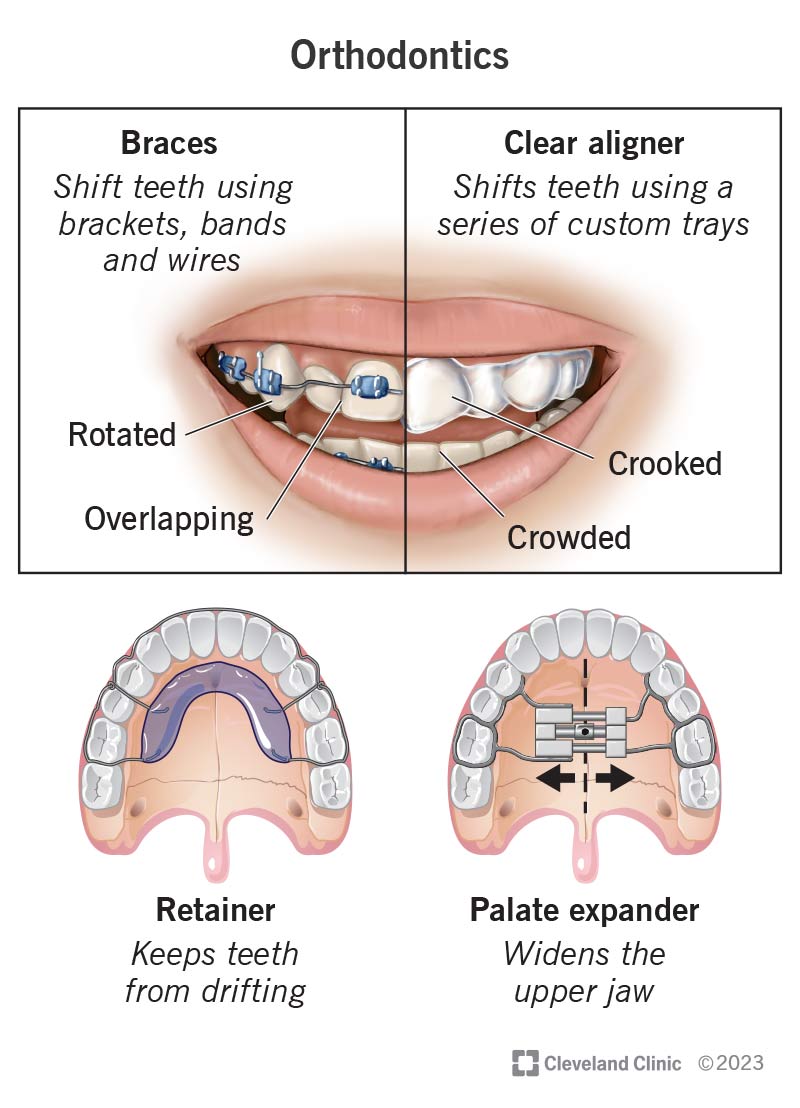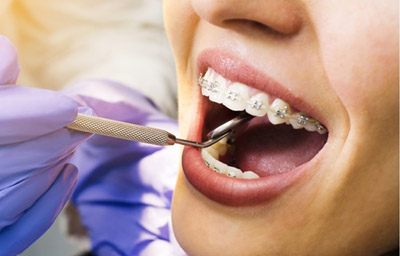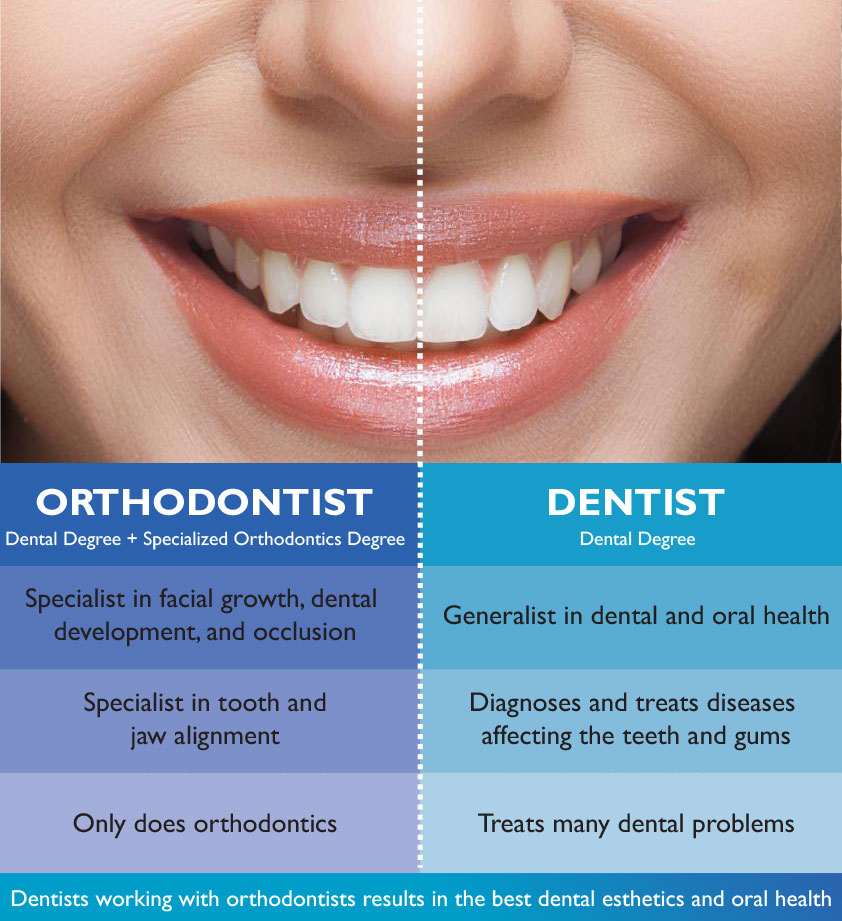The 10-Minute Rule for Causey Orthodontics
The 10-Minute Rule for Causey Orthodontics
Blog Article
The 2-Minute Rule for Causey Orthodontics
Table of ContentsThe Buzz on Causey OrthodonticsAll About Causey OrthodonticsCausey Orthodontics Things To Know Before You BuyCausey Orthodontics for DummiesRumored Buzz on Causey OrthodonticsThe 3-Minute Rule for Causey OrthodonticsThe Causey Orthodontics Ideas
What is the distinction in between a dental expert and an orthodontist? All dentists, including orthodontists, treat the teeth, periodontals, jaw and nerves.
Orthodontists and dentists both offer oral treatment for patients. Orthodontists can function in an oral office and provide the exact same therapies as other dental practitioners. So you can believe of both medical professionals who treat gum and teeth issues. The main difference is that coming to be an orthodontist needs a certain specialized in dealing with the imbalance of the teeth and jaw.
Some Known Details About Causey Orthodontics
An orthodontist is a dental expert that has undergone training to specialize in the medical diagnosis, avoidance and therapy of irregularities in the jaw and teeth. They can also determine possible problems in teeth alignment that might establish when problems are left neglected (affordable orthodontist near me).
This includes all the needed education to become a basic dental practitioner. According to the American Trainee Dental Association (ASDA), it indicates you will require to have either a Medical professional of Medication in Dentistry (DMD) or a Physician of Oral Surgery (DDS). Simply put, orthodontists require to complete dental college and afterwards get an orthodontics specialty education and learning.
Some orthodontists also get their masters in craniofacial biology. orthodontist services (https://us.enrollbusiness.com/BusinessProfile/6789229/Causey%20Orthodontics). Numerous oral schools offer minimal orthopedic training and guideline, which is why basic dental professionals require to head to orthodontic college after graduation. Orthodontic residency programs use extensive training for this kind of dental expertise. These programs concentrate on two particular areas or disciplines: Dentofacial Orthopedics: This research concentrates on assisting teeth and jaw advancement.
Get This Report about Causey Orthodontics

 These consist of apparatus such as braces, retainers and Invisalign. What does an orthodontist do, and what do they focus on? The overall goal of an orthodontist is to enhance an individual's bite. Not everybody is born with straight teeth, and an orthodontist will certainly ensure that people get evenly spaced straight teeth.
These consist of apparatus such as braces, retainers and Invisalign. What does an orthodontist do, and what do they focus on? The overall goal of an orthodontist is to enhance an individual's bite. Not everybody is born with straight teeth, and an orthodontist will certainly ensure that people get evenly spaced straight teeth.
All About Causey Orthodontics
The American Organization of Orthodontists recommends your very first check up by age 7. You'll need to see your orthodontist if you have a misalignment in your teeth, likewise called malocclusion. Likewise, if you observe uneven bite patterns, a somewhat askew jaw, or when your teeth are jammed, you will likely need orthodontic therapy.
At Advanced Orthodontics, we provide clients with a alternative treatment experience. Furthermore, we provide flexible therapy routines, flexible repayment choices and an enjoyable, satisfying experience. Telephone call ( 480) 357-4900 today for more details and timetable an appointment.
An orthodontist is a dental professional trained to identify, avoid, and treat teeth and jaw abnormalities. Orthodontists work with people of all ages, from children to adults (http://www.usaonlineclassifieds.com/view/item-2702161-Causey-Orthodontics.html).
Little Known Questions About Causey Orthodontics.
Malocclusion, or misaligned teeth, can lead to oral concerns, consisting of dental cavity, periodontal illness, and challenging or unpleasant chewing. Not everybody is born with straight teeth. If you have a poor bite or big areas between your teeth, you might intend to get in touch with a dentist specializing in orthodontic care.
(Image Credit Rating: DigitalVision/Getty Images) Orthodontists make use of taken care of and detachable dental devices, like braces, retainers, and bands, to transform the position of teeth in your mouth. Orthodontic therapy is for oral irregularities, including: Misaligned teethBite problems, like an overbite or an underbiteCrowded teeth or teeth that are as well much apartJaw misalignmentThe objective of orthodontic treatment is to improve your bite.
How Causey Orthodontics can Save You Time, Stress, and Money.

, yet not all dentists are orthodontists. They focus on 2 areas: Just how to correctly and safely move teeth Exactly how to effectively direct development in the teeth, jaw, and faceOnce an orthodontist has actually completed training, they have the option to end up being board certified.
Misalignment, or malocclusion, is the most typical factor people see an orthodontist. It is hereditary and is the result of size distinctions in between the upper and lower jaw or between the jaw and teeth. family orthodontics. Malocclusion causes tooth congestion, an irregular jaw, or uneven bite patterns. Malocclusion is normally treated with: Your orthodontist affixes metal, ceramic, or plastic square bonds to your teeth.
The smart Trick of Causey Orthodontics That Nobody is Talking About
If you have just small malocclusion, you might have the ability to make use of clear braces, called aligners, as opposed to typical dental braces. Some people need a headgear to aid relocate teeth right into line with pressure from outside the mouth. After dental braces or aligners, you'll need to put on a retainer. A retainer is a custom-made gadget that keeps your teeth in place.
Report this page